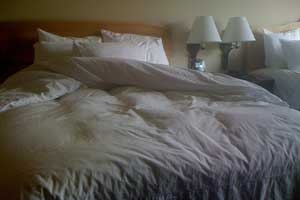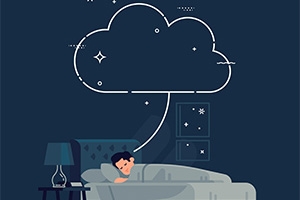How to Cure Insomnia Naturally
5 tips to get you sleeping through the night
 "How to Cure Insomnia Naturally" courtesy of rvrastered
"How to Cure Insomnia Naturally" courtesy of rvrastered"Sleep. That's all I need, just some sleep. I've suffered insomnia for years and it's got worse." Natalie was in her fifties. She told me how she had driven around New Zealand recently and barely slept a wink the whole time. "I've always had trouble switching off, getting to sleep, and staying asleep. I was on sleeping pills but they didn't help. I've tried hypnotherapy, exercising during the day, even faith healing! You'd think driving all day in New Zealand would have worn me out enough to sleep, but it didn't."
You might have already read my "5 Restful Ways to Fall Asleep Fast" article, which has tried and tested ways to get you off to sleep - and I recommend you try them. Here you'll get some more ideas that helped me help Natalie overcome insomnia and start getting the recuperative sleep she so badly needed. Let's start with the basics:
1) Check for hygiene
When someone has had a long-standing problem, they often become experts in it. Unsurprisingly, Natalie knew all about 'sleep hygiene', but I had to check. One woman once told me how, if she couldn't sleep, she'd get up and make herself a nice strong cup of coffee. So I never assume.
For example, did Natalie:
- Reduce 'digital stimulation' such as TV and computer usage before bedtime?
- Reduce or cut out caffeine? Natalie had long since quit drinking tea or coffee or abusing nicotine.
- Avoid alcohol before bed? Booze gets us off to sleep, but then wakes us up later in the night and it prevents proper refreshing sleep anyway.
- Go to bed when she was tired? ("I'm always tired!") Okay, go to bed at a set time each night?
- Find a way to deal with worries? Worry is a stimulant just as surely as caffeine is.
- Avoid sleeping in the day? Sleep is like an animal that needs to be caught, trained, and confined to night time. Sleeping too much in the day will disrupt the sleep/wake cycles in your brain.
- Avoid exercise after 5pm? Actually, Natalie had been exercising hard much later than this and had therefore been over-stimulating her system.
- Avoid eating too much before going to bed? Feeling bloated and uncomfortable is not an aid to sleep.
- Have a 'sleep ritual', a routine and gradual wind-down? I helped Natalie devise one: Switch off TV at 10pm, a warm bath (the relative cooling after a hot bath makes us feel sleepy), read a few chapters of her novel, get into bed, if she still felt like reading then read a little more, then switch off the light.
I also checked her room wasn't too warm or cold, that it was dark, and that sounds around weren't disturbing her.
Once we'd checked that her sleep hygiene was okay and had devised a bedtime ritual, we started to look at times when her insomnia had been much less of an issue. Why would we do this?
2) Cure insomnia by understanding your sleep patterns
Natalie knew a lot about insomnia and had worked hard over the years to cure it. And sometimes it had been better. When we train therapists, we ask them to look not just at when the problem has been there, but also when it hasn't. By learning when something is naturally better, we can find clues as to how the person can learn not to have the problem.
"So tell me about times when the insomnia hasn't been so bad."
Natalie's face lightened and the creases on her forehead seemed to smooth. "When I was on holiday staying at a friend's house in France. For some reason, I just slept so well when I was there. I actually forgot about the insomnia completely!"
Think about times when you were sleeping better. What was different during that period of your life? Were you in a quieter place? Were you eating differently? Getting more fresh air? More enthusiastic and engaged in your daily activities?
Of course, being on holiday isn't 'real life', but can we make 'real life' more like a holiday? Natalie started purposefully spending more time outdoors, which she realized she'd been doing in France.
3) Cure insomnia through win/win situations
Dr Milton Erickson, world-renowned hypnotherapist, would sometimes describe hours spent awake as "bonus hours". We all know that trying to sleep makes it less likely to happen. If you're wide awake, don't be wide awake in bed. Bed is for sleep (mostly). Natalie would spend hours lying in bed awake, worrying about not sleeping.
"Do you have anything to be getting on with?" I asked her.
"Yes, I'm writing an important audit report for work. Sometimes I lie awake at night thinking about that."
"Okay. Now, I don't want you to try to sleep. When you start to sleep through, it will be because sleep has returned naturally. Now, next time - if there is a next time - you find yourself wide awake, get up, go into another room - one that isn't too warm or too light - and work on that report."
Natalie actually did this. She slept much better after I worked hypnotically with her, but she was still waking up feeling alert and restless. So she got up and worked on her report. It took her mind off insomnia for a while, gave her a sense of accomplishment and relief (that it was being done), and also gave her an alternative ("Oh well, if I don't sleep tonight I can always work on that report.").
Strangely, we had created a win/win situation, but here's the thing: bit by bit, Natalie started to rebel. She found it harder and harder to get up to work in the night. When she did, she was working for increasingly less time. She started to sleep through.
My questions went from: "How is that insomnia?" to: "Well, how much work have you got done in the night?" She even started to sound slightly sheepish that she hadn't been working, but sleeping instead! I had to gently remind her that sleeping through was a good thing, but if she ever did find herself wide awake she could use those "bonus hours" to get ahead in her work. If you're really not sleeping, get up and do something else.
4) Still the mind
I've gone through times of mild insomnia in my life, especially in the years before I started to learn how to self-hypnotize. There is a particular technique I'd like to share with you, as it has been very effective for many people, Natalie included.
Insomnia is about stimulation. Even if we feel tired, what prevents us sleeping is heightened arousal of some kind (ever try to sleep when you're really mad at someone?). I used to find my head full of silly thoughts - what people had said that day, what I might do in the morning - not all worries, but many of them unwanted intrusions into my mind.
I started experimenting with self-hypnosis. Here's what I do:
- Become aware that my mind is whirling, even 'spinning'.
- Imagine watching myself sitting, looking calm and breathing deeply - perhaps in a very peaceful-looking garden.
- Visualize those thoughts as lots of white doves (or sometimes small bits of grey mist) flying rapidly around me in a circle, almost in a frenzy. In this way, I'm watching the thoughts, but they're separate from me.
- Watch as the speeding vortex of thoughts spinning around the image of myself starts to gradually slow down - thoughts... slowing... down...
- Now some of the doves (small bits of mist) start to fly/drift away from me and pretty soon I only have one or two flapping around me. Then even these start to dwindle and form a wider circumference around me until at last they disappear.
So I am pacing my own thoughts: seeing many of them moving fast around me, then I'm seeing them slow and dwindle and disappear. It took me a bit of practice, but this has proven so effective.
5) Don't give up - you will cure insomnia
Natalie was exasperated by the insomnia when she came to see me. Her mind was mostly made up that there was nothing that could be done for her. But I reassured her how remarkably able people are to change something about themselves, even if it's been an (extremely) long-standing difficulty.
I saw her over several weeks and as she started to reclaim her rightful sleep bit by bit, she also started to look younger and, not at all surprisingly, started to become more cheery again. Before we parted company, she told me: "I've started feeling like the real me."

Get a free hypnosis session with our Sleep Well app for iPhone & Android
Includes our most popular sleep session free, with the option to upgrade to 12 more sessions.
Get the Sleep Well app for iOS (iPhone or iPad) here or for Android here.








